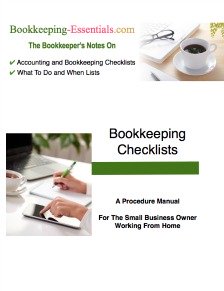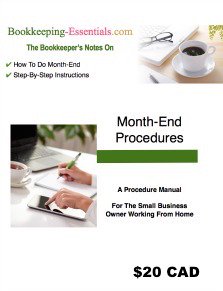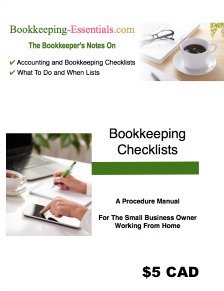Accounting and Bookkeeping Checklists
by L. Kenway BComm CPB Retired
What You'll Find In This Chat
✔ Bookkeeping Checklist When Engaging a New Bookkeeper (or When Switching Bookkeepers)
✔ Year End Accountant Checklist
✔ Who Can Prepare Notice To Reader Financial Statements?
✔ Bookkeeping Checklists eBook is now available to purchase for $5 CAD
What Information Should I Give My Bookkeeper?
A bookkeeping checklist when switching bookkeepers or preparing your tax information for your accountant is really handy. I am going to present both of these lists for you. You will notice they are similar ... but there are a few differences.
BOOKKEEPER'S HANDY REFERENCE
My bookkeeping checklists for daily, weekly, monthly, quarterly, annual and year-end are no longer available on the website.
The six lists are now available for purchase as an eBook. You can purchase it here for $5 CAD. As a bonus, you will find the two checklists on this page in the appendix.

Bookkeeping Checklist
For When You Switch Bookkeepers
You have decided to switch bookkeepers and wonder if there is a
bookkeeping checklist you could use to gather the information for your
new bookkeeper. My answer is yes!
Your new bookkeeper will need the same small business bookkeeping
information you were giving to your old bookkeeper ... plus a trial
balance up to the last date your old bookkeeper did the books as well as a
year-to-date general ledger. Pdf copies placed in DropBox (or similar service), delivered by encrypted mail such as eCourier, or on a CD are preferred over
paper ... but paper still works.
Pssst ... if you are a new bookkeeper, this list will help you too if you are wondering, "What details do I need from a new client?".

GOOD TO KNOW

Your bookkeeper wants to see ALL your source documents pertaining to your business ... unlike your accountant. They need it to ensure they have recorded your business revenue and expenses properly.
The only thing bookkeepers really don't need are your personal receipts. Personal expenses should not be going through your business accounts.
If your bookkeeper (is that you?) doesn't have the knowledge to categorize your transactions properly ... you may be in big, Big, BIG trouble if you are ever audited.
Your bookkeeper will likely give you a client start-up bookkeeping checklist. It will probably look something like this:
- expense receipts including internet receipts - sorted by source of payment: bank, credit card, business cash, and personal funds
- documents pertaining to the purchase, major repair, and sale of capital assets
- documents pertaining to lease agreements, financial loans, insurance or any contracts you have entered into.
- investment statements, bank statements including deposit slips and returned cheques, credit card statements including card payment slips, vendor statements
- a cheque register would be helpful
- a listing of all pre-authorized direct deposits and withdrawals on your bank and credit card statements
- vendor / supplier invoices both paid and unpaid
- listing of accounts payable would be helpful - even if it is just your best guess
- customer invoices and sales receipts issued including outstanding customer invoices
- an accounts receivable listing would be helpful - even your best guess helps marking any doubtful accounts
- listing of all customer deposits and / or prepayments received
- inventory listing
- all government correspondence and tax forms including GST/HST reports filed with CRA this year, notice of assessments, tax instalments, WCB and PST reports
- payroll information and reports including new employee information, payroll reports, PD7As, T4s and T4 summary
Check out this bookkeeping tip that can reduce your overall small business bookkeeping fees. The more organized your records, the less it costs to process them. Further up on the same page is a box with links to more tips on how to reduce your bookkeeping fees.
If you have all the above small business bookkeeping information completed and with you on your first visit, your new bookkeeper should be up and running quickly.

Year end Accountant Package Checklist
A question I am often asked is "I have done my own small business bookkeeping throughout the year. I am now preparing my paperwork for year end. What information does my accountant need?"
Your accountant will need the following small business bookkeeping information packaged in an organized fashion. Some like to keep it all in a year end binder, others in a series of file folders.

GOOD TO KNOW

From the list below, you will see your accountant doesn't want to look at all of your receipts and invoices like your bookkeeper does. Why?
It is most likely that you have a notice to reader engagement, not a review or audit engagement. This means the accountant has not been engaged to review your paperwork.
You or your bookkeeper have processed all the paperwork and put it in a format your accountant can use. Your accountant will go through your small business bookkeeping reports, third party statements and government information reports submitted to CRA (or IRS). S/he will request additional backup from you when necessary.
You can see where this could lead to a problem if your bookkeeping or your bookkeeper's bookkeeping is poor quality ... it leads to problems during a tax audit.
Whatever your recordkeeping system, just make it organized so your accountant can easily find any information s/he is looking for. Whenever possible, it is preferable these days that the information and reports be placed in DropBox (or a similar service), delivered by encrypted mail such as eCourier, or on a CD in pdf format as opposed to paper copies.
So here is my accounting checklist:
- if you are using computer software, a backup copy with password OR an invitation to your cloud software
- trial balance dated for the last day of your previous fiscal year
- trial balance dated for the last day of your current fiscal year
- financial statements for the fiscal year (balance sheet dated last day of fiscal year, income statement for the fiscal period and a cash flow statement if you have it)
- general ledger for the twelve month fiscal period
- general journals for the twelve month fiscal period
- source documents pertaining to the purchase, major repair, and sale of capital assets
- include the original cost and net book value of capital assets sold along with the proceeds receivied upon dispostion of the asset.
- source documents pertaining to incorporation, lease agreements, financial loans, insurance or any contracts you have entered into ... include payments dates and amounts so your accountant can determine if any adjusting entries need to be done
- investment statements and credit card statements
- bank statements for the year including returned cheques as well as the bank statement and cheque stubs for the first month of the following year
- a cheque register would be helpful
- a listing of all pre-authorized direct deposits and withdrawals on your bank and credit card statements
- reconciliations for the bank, credit card and investment statements
- aged listing of all accounts payable identifying any amounts in dispute
- vendor rebates / gift certificates received and/or used from vendors, usually issued as bonuses due to high volume purchases
- aged accounts receivable listing marking any doubtful accounts
- listing of all customer deposits and / or prepayments outstanding
- listing of any accrued liabilities
- inventory listing
- all government correspondence and tax forms filed with CRA (or IRS) this year including GST/HST reports, tax instalments, WCB and PST reports, prior year notice of assessment and income tax returns
- all government grants correspondence or other financial assistance documents
- payroll information and reports including PD7As, T4s and T4 summary (W-2, W-3, W-4 for my American visitors)
If your accountant is also doing your taxes, s/he will also need your home office expense information and your auto log if you use your personal vehicle for business, along with a listing of all your auto receipts.
This bookkeeping checklist is slightly different as your accountant or tax preparer requires a bit more to complete their task.

GOOD TO KNOW

When the work is complete, your accountant should provide you with an adjusted trial balance, adjusting and closing entries.
You or your bookkeeper will need
to post the adjusting and closing entries into your accounting software program before you close your year-end books ... so add this task to your year-end bookkeeping checklist.
Who Can Prepare Notice To Reader Statements?

Once you have used the bookkeeping checklist above, your bookkeeper/accountant will use that information to prepare a financial reports.
This begs the question ... can a non-CA / CGA (chartered accountant / certified general accountant) prepare a Notice to Reader set of financial statements?
Prior to December 14, 2021, this was an easy question to answer. Since then, CPA Canada introduced new compilation engagement standards making it a bit more complicated. Only public practice CPAs can do perform compilation agreements ... non-public practice CPAs (CPAs in employed in industry) cannot perform these compilation engagements.
Here is a summary of the changes published in Bruce Ball FCPA, FCA, CFP's article titled, New standard on compilation engagements: What does it mean for tax work? found on CPA Canada's online March 2021 tax blog:
"The new standard’s application and scope
When performing work for small and medium-sized enterprises, there are three common services that are provided assuming an audit or review is not performed:
- bookkeeping services or assistance
- compilation engagements (i.e., compiled financial information with a practitioner’s communication attached)
- tax return preparation
When looking at the new standard, the key is to determine both the services that your client needs and the potential requirements that could apply. For example, if you provide bookkeeping services and prepare the client’s T2, can you use data from the client’s accounting records to prepare the return without performing a compilation engagement?
The answer to this question is based on the scope exclusions that are contained in the new standard, and in particular, exclusions that are related to bookkeeping and tax work:
- Bookkeeping services: Under the new standard, a compilation engagement is not needed when you prepare the financial information as part of a bookkeeping engagement, whether you help with some of the work or do all of it.
- Tax services: The second exclusion applies where the financial information is presented solely in government-prescribed forms such as corporate, trust or personal income tax returns.
When you combine the two exclusions, if you do bookkeeping for your client (whether all of it or simply a few year-end adjusting journal entries) and use that data to prepare the client’s T2 and other tax forms, a compilation engagement is generally not required. The same is true when preparing T2s based on financial information that your client has provided to you. Of course, you can still undertake a compilation engagement if it would provide value for your client.
With these changes, it will be important to check in with your client regularly to discuss their needs and determine the nature of the bookkeeping, tax and other services they need. An engagement letter setting out the scope of services is also a good practice."
You can see now that you may no longer a compilation engagement report if certain conditions are met.
Prior to December 14, 2021 I would have said the following:
Yes. Notice to Reader (NTR) statements do not require an audit review or audit opinion ... so an uncertified accountant / professional bookkeeper can be engaged for a compilation engagement.
Always remember that it is management's responsibility to prepare ... or arrange to have prepared ... financial statements.The bookkeeping checklists above should help you get yourself organized.
A compilation engagement is limited in scope as it involves compiling data from management into a set of financial statements that may or may not conform to generally accepted accounting principles (GAAP) ... sometimes you only need your financial statement presentation to conform to the Income Tax Act.
The pre-December 14, 2021 NTR report that accompanies the financial statements stated:
- The nature of the assignment - to compile date received from the sole proprietor or management into a set of financial statements.
- The scope and limitations - clearly states that a review or audit was not performed nor accuracy of data verified.
- A caution to readers - that the statements may not be appropriate for their use.
- Who prepared the report - lets the reader know the competence / professional status of the person / firm preparing the report.
The new 2021 compilation standards now require the following communications:
- NEW Report is changed from Notice to Reader to Compilation Engagement Report
- No Change Salutation. Example verbiage: To Management of ABC Company
- EXPANDED The nature of the assignment - to compile date received from the sole proprietor or management into a set of financial statements. Example verbiage: On the basis of information provided by management, we have compiled the balance sheet of ABC Company as at December 31, 20X1, the statement of income and retained earnings for the year then ended and Note X, which describes the basis of accounting applied in the preparation of the compiled financial information [and, if applicable, other explanatory information] (“financial information”).
- NEW Description of Management's Responsibilities - Example verbiage: Management is responsible for the accompanying financial information, including the accuracy and completeness of the underlying information used to compile it, and the selection of the basis of accounting.
- NEW Description of Practitioner's Responsibilities - Example verbiage: We performed this engagement in accordance with Canadian Standard on Related Services (CSRS) 4200, Compilation Engagements, which requires us to comply with relevant ethical requirements. Our responsibility is to assist management in the preparation of the financial information.
- EXPANDED The scope and limitations - clearly states that a review or audit was not performed nor accuracy of data verified. Example verbiage: We did not perform an audit engagement or a review engagement, nor were we required to perform procedures to verify the accuracy or completeness of the information provided by management. Accordingly, we do not express an audit opinion or a review conclusion or provide any form of assurance on the financial information.
- No Change A caution to readers - that the statements may not be appropriate for their use. Example verbiage: Readers are cautioned that the financial information may not be appropriate for their purposes.
- No Change - Who prepared the report - lets the reader know the competence / professional status of the person / firm preparing the report. Example verbiage: [Practitioner’s signature] [Date of the report] [Practitioner’s address]
The above communication requirements are a different sort of bookkeeping checklist but important all the same.
This leads to the next question ... do you need to have GAAP and/or ASPE financial statements prepared annually for your business? Click here to find out.
Remember, you can purchase my month-end procedures to ensure you have a more accurate set of books.
I hope you found these two basic bookkeeping-checklists useful.

See you on the next page ...
Your tutor Lake
Bookkeeping Essentials › Small Business Accounting › Bookkeeping Checklist
Enjoy A Tea Break With
Me Today. Let's Chat!
Use the search feature to quickly find the
information you're looking for.
Join Me On Facebook
Help support this site by "liking" me! Here's where I post current information.
Listed Under Websites NOT Local Business.
This website is NOT associated with the business operating in Bonnyville AB.






